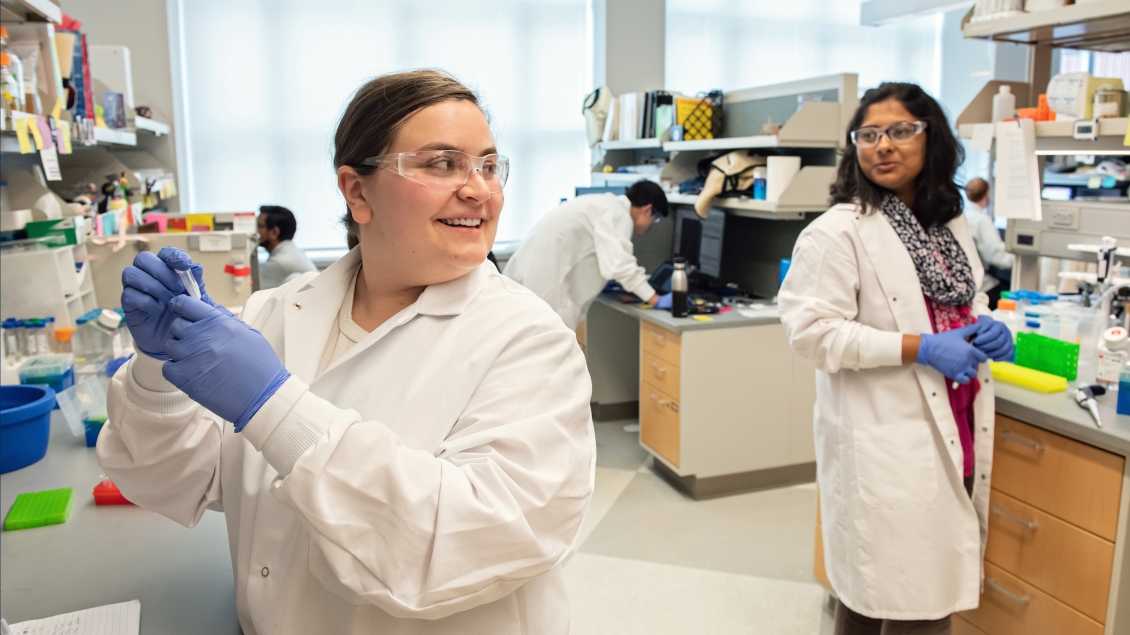-
Bioinformatics -
Biological Chemistry -
Cancer Biology -
Cell & Developmental Biology -
Cellular & Molecular Biology -
Genetics and Genomics -
Health Infrastructures & Learning Systems -
Immunology -
Microbiology & Immunology -
Molecular, Cellular & Developmental Biology -
Molecular & Cellular Pathology -
Molecular & Integrative Physiology -
Neuroscience -
Pharmacology

Immunology
Fostering a scientifically vibrant program and cutting-edge research
Program Overview
The goal of the doctoral Program in Immunology at the University of Michigan is to train future leaders at the forefront of molecular and cellular immunology. Furthermore, our objective is to guide and prepare students for cutting-edge research in immunology while equipping them broadly to address scientific questions from multiple perspectives.
Students learn to think independently while pursuing individual research interests in a uniquely diverse and flexible program. More than 54 faculty members from the schools of Medicine, Pharmacy, Dentistry, and the College of Literature, Science and the Arts (LSA) provide graduate training in immunology by incorporating concepts of molecular biology, biochemistry, genetics, and biophysics into the curriculum.
Over 50% of the Immunology faculty members are in clinical departments, which allows Immunology to provide unprecedented opportunities for students to be trained in and to perform translational research. An additional advantage of the individualized training provided by the Immunology Ph.D. Program is that it allows students to combine a broad foundation of coursework with research in the laboratories of their chosen research mentors. Individual attention and mentoring are standout strengths of this exciting and innovative program.
Coursework
Students take courses in cell and molecular immunology, immunologic methods and transnational immunology, plus a core course in biochemistry, genetics, or cell biology. Electives are selected from a wide range of courses devised to complete the student's preparation for advanced study and research.
Our trainees receive a strong knowledge base in immunology as well as the vital research presentation and writing skills required for their career development. Students emerge from this training experience with a thorough grounding in cellular and molecular immunology and an understanding of how to exploit this knowledge in the study of disease processes. Each student obtains sufficient experience in investigation, and a sufficient record of accomplishment to be considered a strong candidate for postdoctoral research training and support at nationally prominent labs.
Preliminary Examination
After completing coursework, students take the preliminary exam during the second year. The preliminary examination tests the student’s ability to reason analytically and to develop ideas and defend them. The format consists of a written research proposal similar to the NIH research grant format on a topic of their choosing. The written proposal is followed by an oral defense of the research plan. The proposal is expected to be an in-depth presentation of a research plan to investigate a contemporary question in immunology. The student is responsible for identifying the question and devising logical and convincing experimental approaches to address the issue. In the written proposal and the oral defense, the student is expected to demonstrate a thorough understanding of the research problem, as well as to creatively think about the topic and experimental design. Thus, the emphasis is on hypothesis testing and experimental design, as well as general knowledge in the field of immunology.
Teaching Requirement
The Immunology Program has no formal teaching requirement, but will provide access and training to individuals who want a teaching experience.
Expected Length of Program
Usually about four to five years.
The Immunology Program provides an interdisciplinary structure and an inclusive environment through which immunologists in a variety of departments can collaborate to meet educational and training objectives. The Immunology PhD Program fosters interactions among students and faculty in the Program to broaden the students’ appreciation of diverse research opportunities and to encourage interdisciplinary thinking in a highly collaborative atmosphere. Our goal is to continue to provide a firm basis in immunology through individualized training.
Drawing on resources from throughout the University, students first obtain a strong foundation in cellular and molecular immunology, then pursue individual interests in rotations while spanning a broad variety of cutting edge areas.
Our students are also involved in a variety of activities while they are in our program:
Spring Retreat
Every spring, the Immunology Program sponsors an off-campus retreat where selected research within the program is highlighted. Only graduate students and research fellows present their work.
Seminar Series
The Immunology seminar series, held during the Fall and Winter terms, includes formal presentations by speakers from outside the University of Michigan. Students are encouraged to nominate and host external researchers whose work they find thrilling and innovative. Students are given the opportunity to meet with the speakers at a luncheon immediately following the seminar. In addition, highlighted faculty research presentations are given by student-selected GPI faculty.
Social Activities
The GPI plans social events throughout the year, including: mails, Fall Picnic, canoeing/kayaking, movies, sporting events, and a holiday party. We also pair new students with experience peer mentors.
The Immunology program gives a foundation that enables students to pursue a broad range of career choices spanning from academics to industry, and from the theoretical to the translational. Immunology program alumni have gone on to compete successfully in academia, biotechnology and an increasing number of other domains in our advancing technological world.
We look forward to connecting with you!
Graduate Program in Immunology Director: Malini Raghavan, PhD ([email protected])
Graduate Program in Immunology Administrator: Catrice Evans ([email protected])
Learn more about the Graduate Program in Immunology.